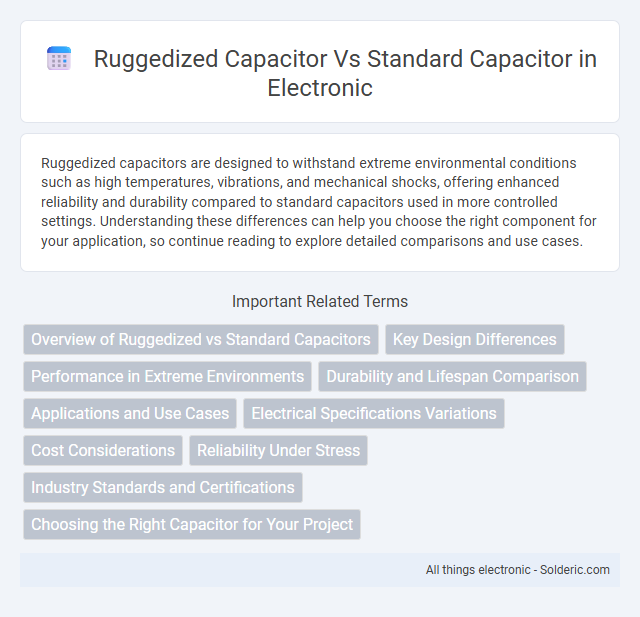Ruggedized capacitors are designed to withstand extreme environmental conditions such as high temperatures, vibrations, and mechanical shocks, offering enhanced reliability and durability compared to standard capacitors used in more controlled settings. Understanding these differences can help you choose the right component for your application, so continue reading to explore detailed comparisons and use cases.
Comparison Table
| Feature | Ruggedized Capacitor | Standard Capacitor |
|---|---|---|
| Durability | High; designed for harsh environments, shock, and vibration resistant | Moderate; suitable for general indoor use |
| Operating Temperature | Wide range: -55degC to +125degC or higher | Typical range: -40degC to +85degC |
| Reliability | Enhanced reliability for military, aerospace, and industrial applications | Standard reliability for commercial electronics |
| Encapsulation | Hermetic or robust casing to prevent moisture and contaminants | Plastic or epoxy coating |
| Cost | Higher due to specialized materials and testing | Lower, mass-produced |
| Size & Weight | Typically larger and heavier to withstand stress | Compact and lightweight |
| Applications | Military, aerospace, automotive, industrial equipment | Consumer electronics, general-purpose circuits |
Overview of Ruggedized vs Standard Capacitors
Ruggedized capacitors are designed to withstand extreme environmental conditions such as high temperatures, shock, and vibration, making them ideal for aerospace, military, and industrial applications. Standard capacitors, while suitable for general-purpose electronic circuits, lack the enhanced durability and reliability features found in ruggedized versions. Your choice between the two depends on the operating environment and the required performance stability under stress.
Key Design Differences
Ruggedized capacitors feature enhanced materials such as reinforced dielectrics and robust casings to withstand extreme environmental conditions like shock, vibration, and temperature fluctuations, unlike standard capacitors designed for regular applications. Their key design differences include thicker electrode layers, hermetic seals, and improved thermal stability, which provide superior durability and reliability in harsh industrial or military settings. Understanding these distinctions helps you select the appropriate capacitor for applications where long-term performance under stress is critical.
Performance in Extreme Environments
Ruggedized capacitors are designed to maintain stable performance under extreme temperatures, vibrations, and humidity, making them ideal for harsh environmental conditions where standard capacitors may fail. Their robust construction, including reinforced encapsulation and higher quality dielectric materials, ensures reliability and longevity in aerospace, military, and industrial applications. Choosing a ruggedized capacitor enhances the durability of Your electronic systems when exposed to demanding operational environments.
Durability and Lifespan Comparison
Ruggedized capacitors are engineered with enhanced materials and construction techniques to withstand extreme environmental conditions such as high vibration, moisture, and temperature fluctuations, resulting in significantly longer durability and lifespan compared to standard capacitors. While standard capacitors may degrade rapidly under harsh use, ruggedized versions maintain stable performance and reliability over extended periods, making them ideal for critical applications in aerospace, military, and industrial sectors. Choosing a ruggedized capacitor ensures your electronic systems experience fewer failures and reduced maintenance costs over time.
Applications and Use Cases
Ruggedized capacitors are designed for extreme environments, making them ideal for aerospace, military, and automotive applications where resistance to temperature fluctuations, vibration, and mechanical shock is critical. Standard capacitors are commonly used in consumer electronics and general industrial applications where environmental stresses are minimal. Ruggedized capacitors offer enhanced reliability and longevity in harsh conditions, whereas standard capacitors prioritize cost and general performance in controlled environments.
Electrical Specifications Variations
Ruggedized capacitors exhibit enhanced electrical specifications compared to standard capacitors, including higher voltage ratings, improved temperature stability, and lower Equivalent Series Resistance (ESR). These capacitors maintain consistent capacitance and reliable performance under extreme environmental conditions such as high vibration and shock. Standard capacitors typically offer narrower operating temperature ranges and lower durability, making them less suitable for demanding applications.
Cost Considerations
Ruggedized capacitors typically incur higher costs than standard capacitors due to enhanced materials and manufacturing processes designed for extreme environments and improved reliability. These capacitors justify their premium price in applications requiring durability, thermal stability, and resistance to mechanical stress. Standard capacitors, while more cost-effective, may fail prematurely in harsh conditions, potentially leading to increased maintenance and replacement expenses.
Reliability Under Stress
Ruggedized capacitors exhibit superior reliability under stress due to their enhanced construction featuring reinforced terminals, thicker dielectric layers, and robust encapsulation materials, which enable them to withstand extreme temperatures, vibrations, and mechanical shocks better than standard capacitors. These capacitors maintain stable capacitance and low equivalent series resistance (ESR) in harsh environments, making them ideal for military, aerospace, and industrial applications where failure is not an option. Standard capacitors, while suitable for general use, tend to degrade faster under similar stress conditions, leading to potential circuit failures and reduced overall system reliability.
Industry Standards and Certifications
Ruggedized capacitors comply with stringent industry standards such as MIL-PRF-55365 and IEC 60068, ensuring enhanced durability and reliability in extreme environments. Standard capacitors typically meet general IEC standards but lack certifications required for military or aerospace applications. Certification differences directly impact their suitability for high-vibration, high-temperature, and harsh conditions in critical industries.
Choosing the Right Capacitor for Your Project
When choosing the right capacitor for your project, consider ruggedized capacitors for environments with extreme temperature, vibration, and moisture exposure due to their enhanced durability and reliability. Standard capacitors suit general-purpose applications with stable conditions, offering cost-effective performance. Assessing factors like operating conditions, lifespan requirements, and electrical specifications ensures optimal capacitor selection tailored to project demands.
ruggedized capacitor vs standard capacitor Infographic

 solderic.com
solderic.com